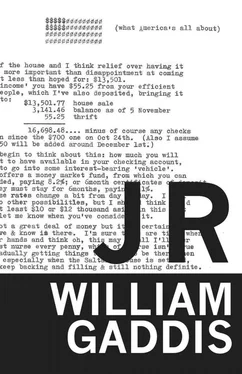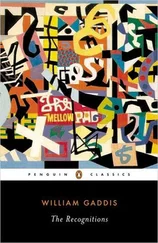Bast stood slowly, cleared his throat muttering — improved! and kicked an empty catfood can at the twisted fender.
— Like all they need here is fill and they, hey wait up… J R dug in a pocket, came up with the handkerchief wad, the pencil stub. — They pay like seven dollars a yard for clean fill, you know hey? he said looking at the sign, scratching the pencil stub on a magazine margin. — Have you got a pencil?
— No, and here. Bast handed over the mail and turned away. — I’m in a hurry.
— But just, okay but sometime could we, hey…? J R stood by the mangled clearing biting at the point of the pencil stub, trying it for a mark, biting again. — Hey Mister Bast? he called, and Bast half raised an arm without lifting his eyes from his lengthening steps toward the main road opening ahead, where the voice barely reached him as he crossed its unkempt shoulder. — I just mean like maybe we can use each other some time, okay…?
Pursuing nothing, unpursued, a police car appeared, sheared past him, its siren tearing the day to pieces out of sight beyond the firehouse and the crumbling plaza of the Marine Memorial behind him as he turned up the highway and crossed, stepping over ruts, tripping against cragged remnants of sidewalk in block lengths allotted by rusted poles still bearing aboveground indecipherable relics of street signs that had signaled a Venetian bent real estate extravaganza in the twenties, until even those limbs of rust lay twisted to earth and naked of any sign of place, of any suggestion of the tumbled column and decollated plaster Lion of St Mark’s moldered smooth there in the high browned grass where he turned in, any memory at all but these weeds recalled by the aged as Queen Anne’s laces lining ruts which led back into the banks of oak, no cars but those seeking seclusion for the dumping of outmoded appliances, fornication, and occasional suicide, and those far fewer and on foot who knew it for a back entrance to the Bast property.
— Those woods were filled with people that summer, ’twenty-five was it, Julia? or ’twenty-six? You recall Charlotte was just back from Europe, men dressed up in gondoliers’ hats they actually had a gondola too, down at the creek at that little bridge. A white pitched bridge going absolutely nowhere and how she laughed, she had just come from Venice.
— She stopped when she saw James out in the midst of it, selling waterfront lots to those poor people. They’d been brought out from town on special trains free.
— Waterfront…?
— They were told it would be waterfront, Stella. With docks for ships coming in from Europe and canals like Venice, and they believed it.
— I don’t think James tried to deceive them, Julia. James took it all as rather a lark.
— A lark? People losing their whole life’s savings? Most of them had been domestics, they could hardly speak English.
— Is this Uncle James? here, in this hat? Stella asked absently, mirrored in the picture’s glass, her back to them in a simple curve of gray tailored to the grave decline of her shoulders.
— No, James, James didn’t put on one of those getups. The gondolier’s hat and all the rest of it, none of that was his idea at all. He was simply selling lots on commission for Doc what was his name, when he went to jail…
— No, no, Anne. She means that picture over there, James in some sort of academic costume. An honorary something he got somewhere after that first performance of his…
— And where is he now?
— There’s a card from him Stella, it’s there on the mantel. A picture of a castle.
— This? with the corner cut off it? There’s no way to know…
— James’ hand is impossible to read. The only way we can write to him is to cut off the return address and paste it on to the front of a letter, and since we never really know where… there! Just hold still for a moment, Stella. Do you see it now, Julia? The resemblance to James?
— If she’d raise her chin a little. A little, perhaps, around the mouth but… is that a scar? Around the throat, it must be the light in here but it looks…
— Julia! I wouldn’t…
— It’s all right, said Stella, turning from them what might have become a smile to draw up her throat’s long and gentle curve. — You see? It goes right around, she seemed to finish, and turned back to the photographs framed on the wall.
— It almost looks…
— You, you might want to wear a necklace, Stella. There was one that belonged to Charlotte, somewhere. Who did that go to Julia? the one with the…
— Oh, I don’t try to hide it… she brought them forward with the dull calm in her voice. — The children in our apartment building, do you know what they say? That I’m a witch, that I can screw my head on and off. They think that this one comes off at night and I put on another…
— Stella! that’s… you, you’re a beautiful girl!
— One that would turn them to stone if they saw it, she went on, all they could see of her expression its movement in the glass, and then — there were beautiful witches after all, she finished with a slight tremor that might have been a laugh.
— What…
— What was it? An operation. Thyroid.
— It’s a shame you… you’ve never had children, Stella. Children of your own, you and… oh, I can never recall his name.
— Whose.
— Why, your husband, Mister…
— Norman, oh, said Stella in the same dead calm, and then — and this? turned again to a picture. — Sitting at the piano beside Uncle James, this little boy. It’s not Edward, is it?
— That? No. No, that’s not Edward, no.
— Is it… anyone?
— It’s… no, it’s a boy. A boy James took in for lessons.
— Reuben? Stella turned abruptly, and stood there as the turn had left her, one foot cocked on a heel. — The boy he adopted?
— He didn’t. James never adopted him. There. Do you see? the stories that get started?
— Yes, that Mister… this lawyer who was here. Prying and gossiping, trying to bring Reuben into things too, saying the adopted child has the same rights as the blood child and so forth, why…
— Here, his card’s here somewhere. Cohen, here it is. You see? he said they’d left out the h. You would think he’d want to get new cards printed.
— Perhaps he doesn’t care to spend the money. It might be cheaper just to change his name, you remember Father saying…
— Why your husband had to send him out here Stella, as though things weren’t confused enough.
— I’m sorry I missed him. When Norman’s secretary said he was coming out to see you and Edward and help clear things up…
— Clear things up? Waving his arms around, breaking furniture, tossing papers every which way? And his language!
— I’m sure that Norman never meant him to…
— Crystal clear but he couldn’t speak simple English, unless you call profanity crystal clear. Be careful of that chair arm, he broke that too.
— Perhaps Edward can fix it, Julia.
— Yes he warned us against Edward, if you can imagine.
— But I’m sure Mister Coen didn’t mean…
— Referring to Edward as an infant…
— A lunatic…
— Talking about suing the Ford Motor Company, using infancy as a sword instead of a shield whatever that means, he kept repeating it. Remember Danziger, he said, versus the Ironclad Realty Company. I won’t forget them in a hurry after that performance, but heaven knows why. I never heard James mention either of them.
— Or Father either, why Mister Cohen even wanted to hear that old story about Father and the violin.
— And that picture of Charlotte in the Indian headdress to prove some notion about resemblances, that gossip about our Indian blood and talking about emancipation, Edward being emancipated! as though we were all a family of… well!
Читать дальше












